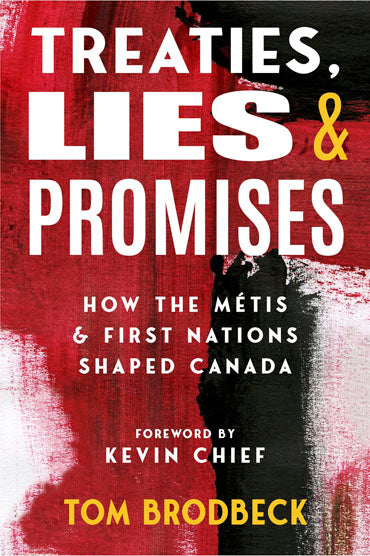
Treaties, Lies and Promises
HOW THE MÉTIS AND FIRST NATIONS SHAPED CANADA
History, Politics
- Price
- $24.95
This riveting account of the links between the Red River Resistance and the numbered treaties explores a largely unknown part of Canadian history.
An engaging, informative and essential account of how the Red River Resistance and the making of the numbered treaties are intrinsically linked. Through evocative details, journalist Tom Brodbeck brings to life pivotal events such as an armed insurrection; outdoor meetings held -29 C weather; a three-person delegation of negotiators from a remote community in Rupert’s Land going toe-to-toe with Canada’s most powerful politicians and First Nations chiefs negotiating their place in Canada under a dark cloud of presumed white, European superiority.
In his clear and easy-to-read prose, Tom describes the impact of these events on the development of Canada. In the span of just a few years, they laid the groundwork for the settlement of Western Canada, a period heavily influenced by Indigenous people: the Métis (French and English-speaking) and First Nations (including Anishinaabe and Swampy Cree). Together, they negotiated both the Manitoba Act and the first of the numbered treaties but the book reveals the challenges Indigenous people faced when confronting the colonial mindset of a federal government eager to populate the west, but less interested in preserving the dignity and long-term welfare of its original inhabitants.
Reviews
Winner: 2024 Manitoba Historical Society's Margaret McWilliams Award for Popular History
“This book is a great gift to Manitobans and to all Canadians.” —Kevin Chief, member of Minegoziibe Anishinabe (Pine Creek) First Nation, Treaty 4; co-founder of the Winnipeg Aboriginal Sport Achievement Centre.
Book Details
Pub Date: September 2024
Trade Paperback
204 Pages
Print ISBN 9781553807162
E-book ISBN 9781553807179
6” x 9”
Other Ways to Buy
Shop independent bookstores
Chapters/Indigo
Amazon
E-books available through your favourite e-book retailer
